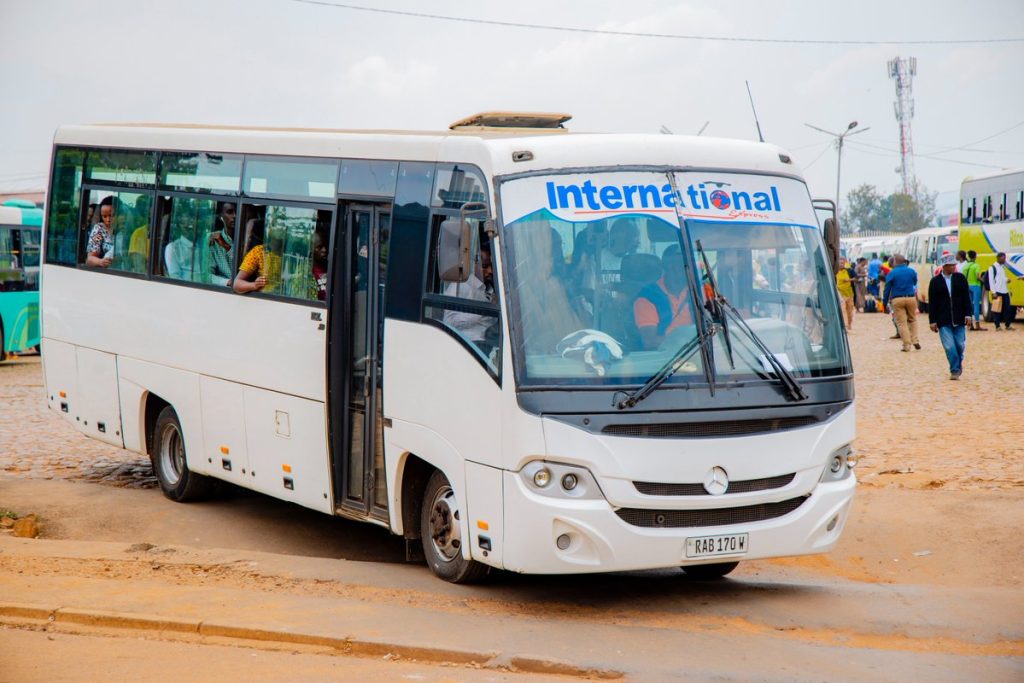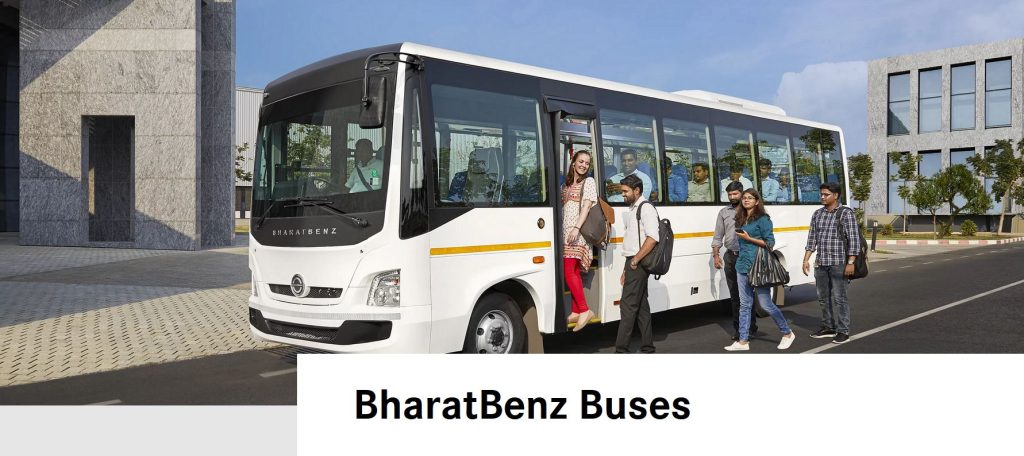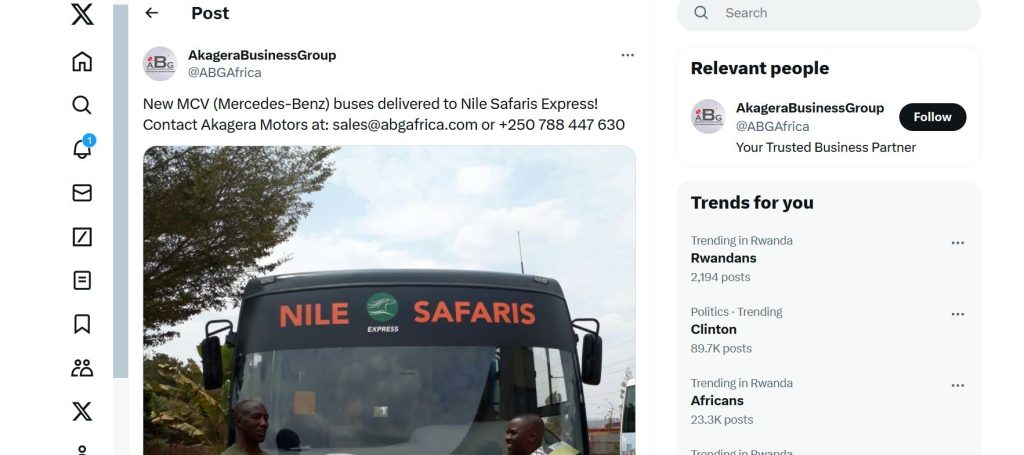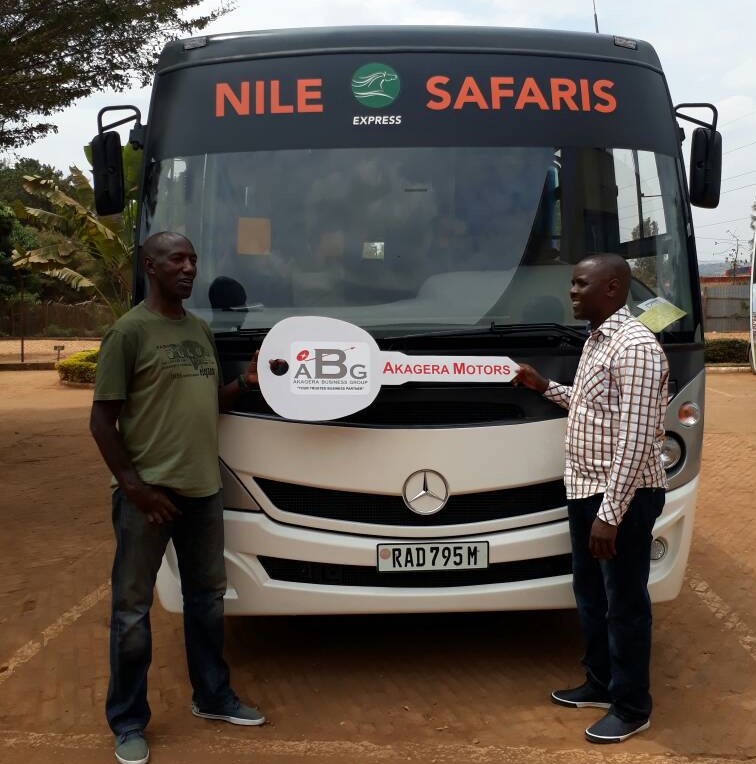In the early hours of August 14, 2017, Akagera Business Group, a prominent Rwandan conglomerate, proudly proclaimed on Twitter the delivery of “New MCV (Mercedes-Benz) buses” to Nile Safaris Express, a local bus company.
The news sparked a variety of reactions from the public, ranging from curiosity to relief among bus companies in Kigali city and the rural areas.
For these bus companies, this announcement signaled a leap towards acquiring technologically advanced and robust performance buses, crucial for navigating Rwanda’s challenging mountainous terrain.
The prospect of enhanced durability, longevity, and superior passenger services made almost every bus company rush to Akagera Business Group’s offices or place quick orders.
While Akagera Motors’ sales team embarked on an intensive door-to-door marketing campaign, the anticipation turned into reality when the new buses hit Rwandan roads.
However, the jubilation was short-lived.
Despite promises of two years of servicing, drivers soon reported technical faults, especially on hilly and mountainous roads, casting a shadow on the buses’ purported Mercedes-Benz quality.
Serious engine and gearbox failures further fueled the discontent, leading to countless complaints from bus companies.
Nile Safaris Express, in particular, grounded four buses due to irreparable breakdowns, resulting in substantial losses.
Some companies continued operating, resorting to changing engines and parts, bound by dubious contracts with Akagera Motors.
These contracts, involving installment payments through postdated bank cheques, left companies unable to reclaim funds.
In a shocking revelation, contracts and proforma invoices with clients showed no explicit mention of Mercedes-Benz brand; instead, the buses were labeled as “MVC 240” as indicated on importation and declaration documents.
However, upon delivery of the buses to the clients with a delivery note the Vehicle Certificates (Yellow Cards) from the Rwanda Revenue Authority (RRA) displayed the Mercedes-Benz brand.
It is still mysterious how Akagera Business Group secured the Yellow Cards, even though they claim it was an error made by RRA.
Meanwhile, RRA rubbished the claims. “The details on a Yellow card are submitted by the owner of the vehicle,” an official at RRA said.
And in this case, thus, it is the agent of Akagera Business Group that submitted the information to the customs officers. “RRA issued the Yellow cards as per details provided.”
Technical investigations by bus companies, including visits to an assembly plant in Kenya, uncovered that the buses were constructed with a BharatBenz engine and an MVC 240 body.
Legal representatives of affected companies cried foul, terming it a scam, although Akagera Motors vehemently contested the allegations.

Nile Safaris Express directly contacted Mercedes Benz, only to discover that the engines were manufactured by BharatBenz at Daimler India Commercial Vehicles in Chennai, India.
This subsidiary of German Daimler Truck AG designed, manufactured, and sold commercial vehicles tailored for the Indian market.
Further complicating matters, it was revealed in 2008, that Daimler AG planned a joint venture with Hero MotoCorp to build medium and heavy commercial vehicles in India.
The joint venture, named Daimler Hero Commercial Vehicles (DHCV), operates under a Memorandum of Understanding (MOU).
Sunil Ramana, an Indian Formula Student Race Car Designer/Builder/Driver, explained the rationale behind Daimler Trucks naming their Indian trucks as Bharat Benz.
He highlighted in an exposé the challenges of the Indian market, where affordability often outweighed performance and safety concerns.
It is said that the brand name Benz was already established and very popular in India and it was synonymous with luxury and performance.
This was a big plus for Daimler because now they didn’t have to spend a lot on establishing their brand at all.
“And for these two reasons, Ramana says, Daimler trucks instead of naming their company “Daimler India Inc” called it “BharatBenz”. “And it worked. The name immediately screamed luxury trucks for Indian market and it did really well.”
However, BharatBenz technology is different from Mercedes Benz except for a few aspects that were borrowed to upgrade the quality of engine, its performance and durability, but there is a huge difference between the two.
Indeed BharatBenz says on its website that its buses are “proudly manufactured locally, with around 90% of the components and parts sourced from Indian suppliers.”

This marketing strategy aimed at saving Daimler’s international reputation by differentiating BharatBenz from Mercedes Benz, was a strategy that proved successful in the Indian market.
Bus companies in Rwanda claimed that Akagera Business Group applied a similar concept, leading to widespread losses and legal disputes.
“And everyone fell for those crappy buses,” a lawyer representing one of the bus companies told Taarifa last week. “Later, the companies found themselves in huge losses and entangled in disputes in courts of law.”
Nile Safaris Express initiated legal proceedings but lost in the initial court battle, appealing a potential loss of Rwf300 million.
The court proceedings unfolded with Akagera Business Group blaming Rwanda Revenue Authority for incorrect brand names on Yellow Cards, insisting that the buses were BharatBenz, not Mercedes Benz.
Despite a myriad evidence, the court dismissed claims against Akagera Business Group.
Akagera Business Group, in an email sent to Taarifa through lawyers, says “We sold the buses to Kigali Safaris Express under three main documents: Proforma Invoice; Contract and Delivery Note.”
They add saying, “None in those documents do indicate that ABG sold a Mercedes Benz MCV 240 as alleged by Kigali Safaris Express,” yet Akagera Business Group’s digital footprint contradicts this argument.

The aftermath witnessed bus companies grappling with financial losses, servicing loans, and managing non-operational buses.
In stark contrast, Akagera Motors continued thriving amid the controversy, leaving local investors uncertain about justice, contingent upon the fairness of the judicial system.
“Akagera Motors has made billions out of this scam, and all this is happening amidst us,” a bus company owner told Taarifa on condition of anonymity. “I dumped the bus in the garage, but here I am today still paying those crooks,” he said.
As conflicting statements emerged, with executives admitting to Taarifa of selling Mercedes-Benz buses. Later, legal representatives denied documented proof.
Akagera Business Group’s lawyers threatened Taarifa with a lawsuit if the story come out not in the favour of Akagera Business Group. “We reserve the right ourselves to file a case in RIB or other institution if it comes to commit offences against my client,” emphasizing their intent to defend their client’s reputation.
In the wake of this intricate legal battle, Rwanda’s bus companies find themselves caught in an alleged supplier fraudulent venture, facing an uphill battle for justice while Akagera Motors seemingly prospers despite the controversy.
The outcome remains uncertain, hinging on the impartiality of the judicial system.




















